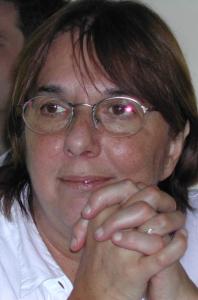 Elsa Duhagon, Choike editor Facebook is not just a way to get back in touch with old classmates from school or see what your “friends” are up to. Activists around the world are taking advantage of this new virtual space to expand their reach and establish more immediate and interactive contact with individuals and organisations from an ever wider range of backgrounds. ITeM, an APC member in Uruguay, talked with APCNoticias about how it is using this web-based tool, and shared some practical advice for others who are experimenting with social networks and other Web 2.0 tools.
Elsa Duhagon, Choike editor Facebook is not just a way to get back in touch with old classmates from school or see what your “friends” are up to. Activists around the world are taking advantage of this new virtual space to expand their reach and establish more immediate and interactive contact with individuals and organisations from an ever wider range of backgrounds. ITeM, an APC member in Uruguay, talked with APCNoticias about how it is using this web-based tool, and shared some practical advice for others who are experimenting with social networks and other Web 2.0 tools.
APCNews: When and why did you decide to use Facebook?
Elsa Duhagon: In late 2008, Choike (the civil society web portal run by ITeM) decided to set up a profile on Facebook to use it as a platform for disseminating content from our website, as well as a way to be in closer contact with our audience. We had initially started out on Facebook as a “group” but later switched to a “friend” profile. It was interesting to see how this approach allowed for much greater interactivity and turned out to be much more “user friendly”, just as the name suggests.
APCNews: What were the results?
ED: We’re still a bit new at this, but we’ve already seen a lot of results in terms of establishing contacts, exchanging communication and publishing photos much more quickly than before, as part of a more equitable, two-way process. On Facebook we have encountered many other organisations who are also using this platform and have been able to immediately establish contact with them. It has also been a way to get to know the faces and communicate much more frequently with people and organisations we collaborate with on a regular basis. We are also able to exchange links to media outlets with useful material.
There are Facebook campaigns that have had a major impact, for instance, “International Criminal Court (ICC): Global ratification” and “End Attacks on Gaza. End Gaza Siege, End the Israeli Occupation”, among others.
APCNews: How does this interaction come about?
ED: Through the RSS feeds of our Facebook “friends” we have access to original material that would have been difficult to find otherwise, such as videos or articles, and we comment back and forth on them. We have received more comments on our Facebook profile than on our website, where most supposed comments end up being spam. We post new material from the website on the Choike Facebook profile wall, as well as other material that is not necessarily posted on the Choike website.
During the 2009 World Social Forum, we received a lot of interesting contributions in the form of photos and comments posted by individuals and organisations who are Facebook “friends” of ours.
APCNews: Could you give us an example of activism on Facebook?
One example is the massacre in Gaza, and the large number of independent media that defied the Israeli government ban on letting members of the press in to cover the conflict. Choike joined a number of campaigns that were formed on Facebook, as well as posting news from these independent media.
In terms of other campaigns, we have recently organised a number of successful ones in coordination with other networks. To do this we use a software tool that makes it possible for other organisations or individuals to join quickly and easily, and also to ensure the legitimacy of signatures. Facebook was used as a launching pad for these campaigns.
Right now we are starting up a new campaign through this same platform, in conjunction with several other networks and organisations: For a new economic and social model: Let’s put finance in its place!.
Like the website, Choike’s Facebook profile has content in both English and Spanish, although information in other languages is occasionally included on Facebook.
APCNews: There have been critiques regarding privacy in Facebook. What has been your strategy in relation to this?
ED: We use FB as a tool for diffusing public information, and we have managed to reach a wide audience that, in some cases, would not have been able to access this type of alternative information. However, we are conscious of the accusations that have been made regarding privacy and intellectual property (FB becomes “owner” of all public content that is published by its users). We take advantage of this platform to diffuse information about the consequences of policies that foster these restrictive measures of intellectual property (the way the World Trade Organization is pressuring countries to sign an agreement for these restrictive intellectual property measures, for example).
Where confidential information is concerned, we do not recommend using Facebook.